Dubai Ramadan Timetable 2024: A Comprehensive Guide
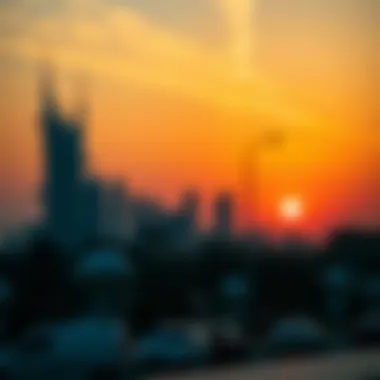
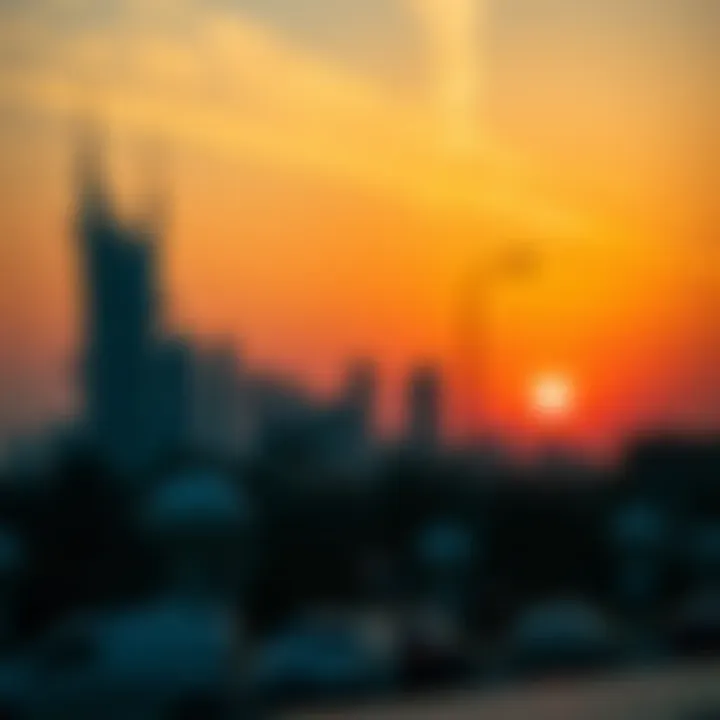
Intro
Ramadan is not just a month; it’s a profound period of reflection and communal engagement in the Islamic culture. In Dubai, where diversity thrives, the observance of Ramadan takes on unique dimensions. The emphasis is not only on fasting but also on fostering a sense of community and spirituality. For residents and visitors alike in 2024, understanding the Ramadan timetable becomes vital, ensuring that everyone can participate in this significant time without missing a beat.
The Heart of Ramadan in Dubai
The month of Ramadan is expected to begin around March 11, 2024, although precise dates may vary based on moon sightings. This period is not limited to simply refraining from food and drink during daylight hours; it extends into prayers, spiritual reflection, and acts of charity. Each evening, upon the call to Maghrib prayer, the fast is broken with iftar—a moment rich in togetherness.
Why a Timetable is Essential
Having a structured timetable for prayer and fasting not only helps in observing the practices but also enriches the experience. In Dubai, where the pace of life can be quite fast, knowing when to pray and when to break the fast allows for a smoother, more fulfilling month. This guide intends to provide a snapshot of the daily prayer timings, other community activities, and opportunities for engagement that define Ramadan in this vibrant city.
Understanding Ramadan
Ramadan holds significant weight in the hearts and minds of millions around the globe. It's not merely a month marked in the Islamic calendar but a profound time of reflection, community, and spiritual growth. This section lays the groundwork for understanding what Ramadan entails, its importance, and its various dimensions that touch the lives of adherents. By exploring Ramadan, one gains insight into both the religious significance and the myriad ways it influences daily living, particularly in a culturally rich city like Dubai.
Historical Significance of Ramadan
Ramadan has deep historical roots, tracing back to the time of Prophet Muhammad when the Quran was first revealed. It serves as a reminder of humility, patience, and empathy towards others, especially those less fortunate. The essence of Ramadan can be viewed through the lens of historical events, such as the Battle of Badr, which occurred during this holy month, emphasizing its importance in Islamic history.
This month invites individuals to connect with their faith on a deeper level, fostering closeness to God through increased prayers and self-discipline. The practice of fasting during daylight beckons the faithful to remember the struggles of the less privileged, creating a collective sense of solidarity. Ramadan’s historical significance is, therefore, not a mere footnote but a crucial chapter in the narrative of faith.
Cultural Practices During Ramadan
Amid the sacred observances, Ramadan blossoms into a vibrant cultural affair. Each community brings its own flair, reflected in the customs and traditions that arise during this month. In Dubai, for instance, the atmosphere is laden with the aroma of culinary delights, as families gather to break their fast. Iftar meals become communal celebrations where neighbors and friends come together to share dishes ranging from the traditional dates to savory stews.
Moreover, the spirit of giving is palpable, as various charitable initiatives gain momentum. It's common for the well-off to share their blessings through iftar meals hosted for the less fortunate, ambassadors for goodwill that resonate deeply within the local culture.
Religious Observances in Ramadan
The religious observances during Ramadan elevate the experience to a highly spiritual one. Muslims engage in enhanced prayer routines, including the nightly Taraweeh prayers which serve to foster community and reflection. The Quran’s recitation takes a central role, with many seeking to complete its reading throughout the month.
In Dubai, mosques overflow with worshippers during these prayers, creating a festive atmosphere that transcends religious boundaries and unites people in their devotion. Additionally, the Laylat al-Qadr, or Night of Power, is a highlight, believed to be the night when the Quran was revealed. It’s a time marked by heightened prayer and reflection, denoting the pinnacle of spiritual engagement that characterizes Ramadan.
By understanding these elements, one can appreciate the multifaceted nature of Ramadan, which extends beyond mere fasting to encompass historical narratives, cultural practices, and religious commitments that bind a diverse community together.
Ramadan Timetable Overview
Understanding the Ramadan timetable for 2024 is essential for both residents and visitors in Dubai who wish to actively participate in this holy month. This section lays out the framework within which Muslims engage with their faith, fostering a deeper sense of community, spirituality, and discipline. Having a solid grasp of the timetable sets the stage for meaningful daily experiences, aligning physical routines with spiritual observances. With prayer times dictating daily activities, planning around these schedules becomes vital, especially in a bustling metropolis like Dubai, where the pace of life rarely slows down.
Start and End Dates
In 2024, Ramadan is anticipated to begin on the evening of Sunday, March 10, and conclude on the evening of Tuesday, April 9. However, as with any lunar-based calendar, the precise dates may shift based on moon sightings. Knowing these dates helps everyone prepare adequately, whether it’s ensuring they have the right food for Iftar, adjusting work schedules, or taking time for spiritual reflection. The commencement of Ramadan, marked by the sighting of the crescent moon, is a moment of great celebration, signifying the start of a month filled with devotion and community.
Important Dates to Remember
Within the holy month of Ramadan lie several significant days and observances that one should keep in mind. Here are a few crucial dates for 2024:


- Monthly Observances: As Ramadan progresses, special evenings known as "Laylat al-Qadr" or the Night of Decree, which falls in the last ten days of Ramadan, is marked by heightened spirituality and is believed to be when the Qur'an was revealed.
- Eid al-Fitr: The end of Ramadan is celebrated with Eid al-Fitr, expected to fall on Wednesday, April 10. This day is marked by communal prayers, feasting, and giving of zakat (charitable giving), emphasizing generosity and community spirit.
- Community Events: Throughout Ramadan, various local charitable initiatives and community Iftar events occur, highlighting the essence of sharing and caring during this sacred month.
Understanding these vital dates not only aids in proper planning but reinforces the communal and spiritual ethos that Ramadan embodies. It creates an atmosphere where preparation and mindfulness lead to a richer, more fulfilling Ramadan experience in Dubai.
Daily Prayer Timings
Daily prayer timings, or Salah, hold a pivotal role during Ramadan. This period of fasting and spiritual reflection is coupled with heightened devotion, and precise timing is crucial for observant Muslims. Knowing when to pray ensures that the observance of these rituals aligns correctly with the overall rhythm of the day, especially when it comes to the early morning prayers before dawn and the break of fast at sunset.
Understanding these timings is essential not only for spiritual reasons but also for social dynamics and community bonding. In a city as bustling and diverse as Dubai, where cultures intersect seamlessly, prayer times allow for collective engagement.
Fajr Prayer Timing
The Fajr prayer marks the beginning of the day. It is performed before sunrise, and its timing varies throughout Ramadan due to the changes in daylight. In 2024, Fajr prayer will generally be around 4:30 AM. This early hour is not just about ritual but serves as a moment of quiet reflection before the day’s activities take over.
Observing the Fajr prayer can be particularly serene in Dubai, with the city still waking up. For many, it symbolizes the dawn of new spiritual insights as well. Setting an alarm or using prayer apps can help with staying on schedule. The tranquility of this moment can set a positive tone for the day, inviting introspection and purpose.
Dhuhr Prayer Timing
After a long morning of fasting, the Dhuhr prayer is scheduled when the sun reaches its zenith. For 2024, this will be around 12:30 PM. During Ramadan, this break allows individuals to pause and reconnect spiritually. It gives many an opportunity to reset their mindset in the hustle of the day. Taking a moment in the middle of a busy schedule assists in focusing on gratitude and intention.
Asr Prayer Timing
The Asr prayer, performed in the late afternoon, often around 3:30 PM during Ramadan, represents a transition. As the day progresses towards iftar, choosing to engage in the Asr prayer becomes a moment to pause and reflect before the day’s conclusion. This prayer encourages mindfulness and can be seen as preparing oneself for the evening’s collective gatherings. Asr reminds practitioners that even in the busyness of life, spirituality and focus on faith should remain a priority.
Maghrib Prayer Timing
Maghrib is perhaps one of the most anticipated prayers, falling just after sunset. In 2024, it is expected around 6:45 PM in Dubai. For many, the call to Maghrib signifies the end of fasting for the day. Individuals gather with family, friends, or community members to break their fast, often leading to a shared meal and nourishing conversations. It's a vibrant time filled with joy, and the prayer garners a deeper shared meaning amidst the communal spirit. The act of breaking the fast together solidifies social ties.
Isha Prayer Timing
Isha is the final prayer of the day and is set for around 8:00 PM. This prayer allows reflection on the day’s events and spiritual positioning before the following day begins. During Ramadan, many engage in Tarawih prayers following Isha, which are special night prayers that deepen spiritual connections. They provide an opportunity to listen and reflect upon the recitation of the Quran, enhancing the sanctity and outreach of the month.
Prayer is an anchor, both personally and collectively. Keeping track of these prayer timings can facilitate a deeper understanding of one’s spiritual journey during Ramadan. Individuals are encouraged to incorporate personal reflections or community discussions into their prayer practice to enrich their religious observance.
Iftar and Suhoor Dynamics
Understanding the dynamics of Iftar and Suhoor during Ramadan is crucial for those observing the holy month in Dubai. These two meals not only nourish the body but also foster a sense of community and spirituality. Iftar, marking the end of the daily fast, is more than just a meal; it's a time for families and friends to gather, share stories, and reflect on their day. Suhoor, on the other hand, is the pre-dawn meal that prepares the faithful for the day ahead. Together, these meals play significant roles in maintaining both physical well-being and cultural traditions.
Culinary Traditions of Iftar
Iftar is celebrated typically with dates and water, following the Sunnah of the Prophet Muhammad. However, the customs can vary widely, especially in a multicultural city like Dubai. In homes, you might find dishes like lentil soup, sambusas, and biryani filling the table. Just outside your door, countless restaurants offer special Iftar buffets full of local and international flavors. Whether indulging in grilled meats, hearty stews, or exquisite desserts, the culinary experience of Iftar becomes an unmissable aspect of Ramadan.
- Traditional Dishes: Prepare to savor specialties like Mandi, a fragrant rice and meat dish, or Harees, combining wheat and meat in a rich stew.
- International Flavors: Dubai's cosmopolitan nature allows for a melting pot of tastes, with restaurants serving dishes from around the world, including Italian pasta, Indian curries, and Turkish kebabs.
Each dish holds a story; they reflect the rich tapestry of cultures cohabiting in Dubai. Not just food, these meals symbolize unity and gratitude, uplifting the spirit of Ramadan.
Popular Suhoor Foods
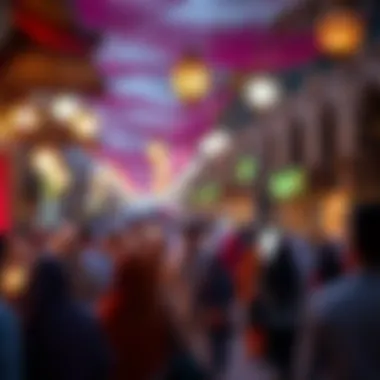
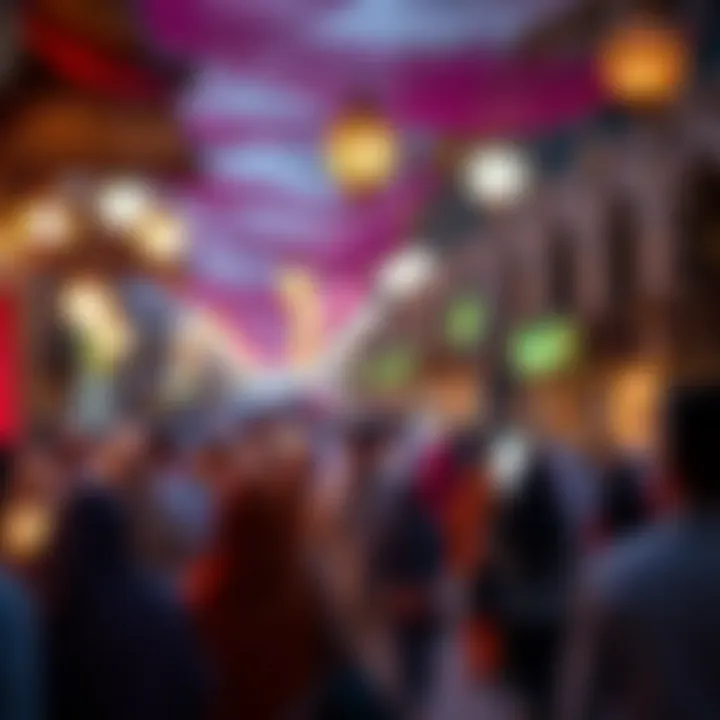
Suhoor meals are anchored on energy-rich foods that sustain individuals throughout the day. A wise choice at this hour can make a world of difference. Many start their morning with wholesome foods like oatmeal or foul medames, a fava bean dish, spiced distinctly.
- Replenishing Options: Yogurt mixed with fruits ensures hydration and provides essential nutrients.
- High-energy Foods: Including whole grain bread, nuts, and cheese are popular. These not only taste good but also help keep energy levels up.
- Hydration is Key: Drink plenty of water or natural juices to combat the heat typical of UAE summers.
The choices during Suhoor set the tone for a fruitful fasting day, balancing nutrition with flavor.
Dining Out During Ramadan
Dining out during Ramadan is an experience laden with special offers and vibrant atmospheres. Many restaurants in Dubai adapt their services to cater to the demand for Iftar buffets. Reservations often fill quickly, so planning ahead is advisable. Dining establishments showcase opulent spreads, some even providing entertainment and cultural performances.
- Community Spirit: Restaurants usually extend Iftar invitations to the less fortunate, fostering a powerful community connection in the spirit of giving.
- Stunning Locations: From rooftop terraces overlooking the Dubai skyline to luxurious hotel dining rooms, each venue provides a unique way to break the fast.
- Local Cuisine emporiums: Authentic places serving traditional Emirati dishes are highly sought after during this month, drawing both tourists and locals alike for their distinct flavors.
Navigating the dining experience during this sacred month offers an opportunity to indulge in culinary delights while respecting the customs that govern this special time of reflection and unity.
As Ramadan advances, the spirit of community and culinary artistry in Dubai during Iftar and Suhoor shines through, inviting everyone to participate in the rich cultural traditions.
Special Ramadan Events and Activities
The month of Ramadan in Dubai is not just about fasting and prayer; it is a vibrantly rich period brimming with communal activities and unique cultural experiences. Engaging in special events and activities enhances the spiritual essence of this month, transforming it into a shared journey of reflection and community bonding. This article delves into the significant events structured around Ramadan, showcasing their impact on individuals and the community.
Community Iftar Gatherings
Iftar gatherings serve as a cornerstone during Ramadan, where families and friends come together to break their fast. In Dubai, these communal events often extend beyond private homes. Many organizations, hotels, and mosques organize large-scale Iftar dinners, welcoming attendees from diverse backgrounds. These gatherings not only promote a sense of unity but also encourage interfaith dialogue—helping to bridge cultural divides.
The experience of sharing a meal with strangers and neighbors often fosters a profound sense of belonging. Occasionally, these events feature local cuisines, offering a taste of Emirati heritage. Visitors are often welcomed to partake in the festivities, emphasizing the inclusive spirit of Dubai.
"The breaking of the fast is not just a meal; it is a gathering that underscores solidarity and compassion among all participants.”
Cultural Festivals and Exhibitions
During Ramadan, Dubai springs to life with cultural festivals showcasing the rich heritage and art of the region. Various art exhibitions, music performances, and traditional dance shows enliven community centers and major venues. The Dubai Cultural Festival often collaborates with local universities to present artistic expressions that reflect Islamic traditions.
Notably, many events aim to educate participants about the significance of Ramadan through storytelling and interactive displays. This cultural immersion provides visitors and residents alike with insights into the profound history and customs that shape Islamic practices today.
Events usually run throughout the month of Ramadan, allowing ample chance for both exploration and learning. The festivals also present opportunities for local artisans to showcase their crafts, handing over a piece of Dubai's soul to the attendees.
Charitable Initiatives
Philanthropy thrives during Ramadan, as many individuals and organizations emphasize charitable giving. Numerous initiatives aim to support the less fortunate, from food drives to fundraisers, making it a time of giving back.
Many Dubai residents engage in donating meals, clothes, or funds to charities. Local businesses frequently join in, and some even provide free Iftar meals to those in need. Initiatives like "Ramadan for All" promote not only the spirit of generosity but also the importance of caring for the community.
Each of these charitable acts strengthens social bonds and fosters gratitude, underscoring the fundamental teaching of compassion at the heart of Ramadan.
Attending these charity events or contributing as a volunteer can profoundly impact one’s experience during the holy month, enhancing the sense of purpose in everyday actions.
In summary, the special events and activities of Ramadan in Dubai amplify the communal spirit, providing opportunities to engage with culture, tradition, and charity. From Iftar gatherings that welcome all to cultural festivals that celebrate heritage, each aspect enriches the overall ambiance of this sacred month.
Navigating Daily Life During Ramadan
Navigating daily life during Ramadan involves a unique set of challenges and adaptations for both residents and visitors in Dubai. This month, revered for its spiritual significance, requires a balance between observance and the practicalities of everyday life. For many, it’s a time for reflection, community, and connection, but it also brings changes that impact routines. Understanding these elements is essential for a smooth experience during this sacred month.
Work Hours Adjustments
During Ramadan, the work schedules for most businesses in Dubai see noticeable adjustments. Many companies opt for shorter working hours to accommodate fasting employees. Typically, the standard workday is reduced to six hours, allowing employees to balance their professional obligations while participating in the religious observance.
The official working hours often start later, allowing for time to prepare for Suhoor, the pre-dawn meal. According to labor laws, work schedules must be flexible and can be subject to specific industry needs. This change benefits both employers and employees, fostering an atmosphere of understanding and respect within various work environments.
To navigate these adjustments:
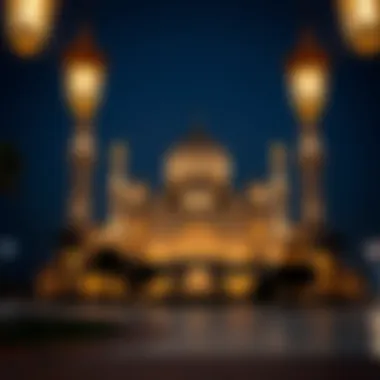
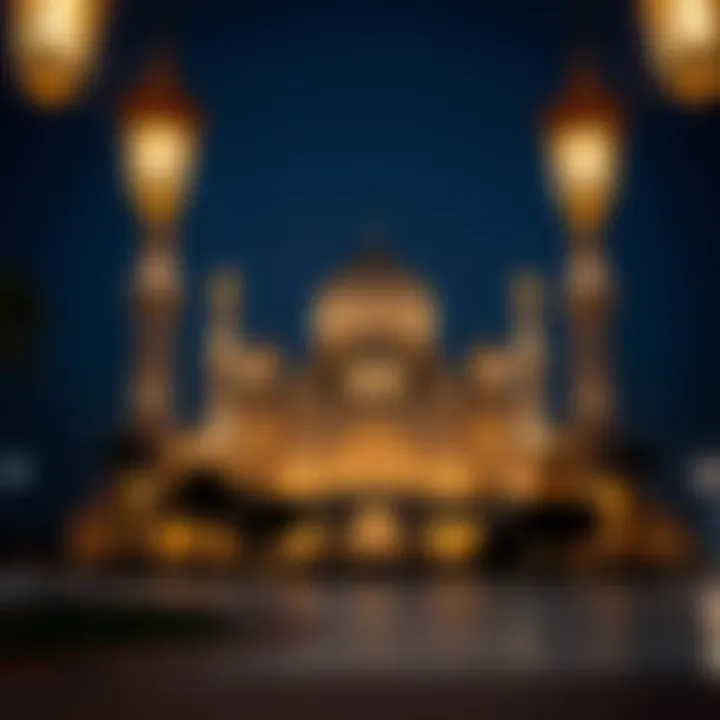
- Know Your Rights: Familiarize yourself with the labor laws around Ramadan. Ensure your workplace is compliant.
- Communicate with Employers: Discuss any concerns or needs with HR or management to navigate the changes effectively.
- Plan Accordingly: Use the additional time for personal activities or community service, embracing the spirit of Ramadan.
Public Transportation Changes
With the increase in religious activities, the public transportation system in Dubai often implements scheduling adjustments to adapt to the flow of passengers during Ramadan. buses, metro, and taxi services tend to have altered hours, especially around the times for Iftar, the evening meal that breaks the fast. This timing is crucial, as many people rush home to eat and pray.
For anyone using public transport, the following considerations are essential:
- Check Timetables: Regularly review the updated schedules for buses and metros. Resources like RTA's official website provide real-time information.
- Plan Extra Time for Travel: Expect crowded public spaces around Iftar and Suhoor times; patience is key.
- Explore Alternative Routes: If possible, carpooling or using ride-share apps may be a smarter choice during peak times.
Shopping and Business Hours
Shopping hours in Dubai transform during Ramadan, with many retail spaces, restaurants, and markets extending their operating times into the late night. This shift accommodates both local residents and tourists wishing to shop or eat after sunset. Major malls and prominent commerce areas often remain open until after midnight, providing ample opportunities to enjoy the vibrant atmosphere that Ramadan brings.
Key points to ponder include:
- Late-Night Shopping: Take advantage of late-night sales and promotions offered during the month. Several retailers host special events.
- Breaking Fast Specials: Many restaurants introduce Arabic Iftar menus, attracting diners with a taste of traditional foods.
- Avoid Peak Hours: If you prefer a quieter shopping experience, consider visiting stores earlier in the day before Iftar crowds gather.
"Ramadan is more than just observing fasts; it’s about enriching our lives through understanding and compassion."
Navigating daily life during Ramadan in Dubai is about embracing the unique rhythms of the month while maintaining a sense of normalcy. By adapting to work schedules, utilizing public transport wisely, and keeping abreast of shopping hours, both residents and visitors can fully engage in the spirituality and community that this significant month fosters.
Travel Considerations for Ramadan
Traveling to Dubai during Ramadan can be both an exciting and enlightening experience. As this sacred month unfolds, visitors have the chance to witness and participate in the unique atmosphere that pervades the city. Understanding the nuances of this occasion is key to enjoying your time in the UAE while being respectful of local customs and traditions. Whether you're visiting for business or leisure, it’s important to consider several elements that can enhance your experience.
Visiting Dubai During Ramadan
Dubai comes alive during Ramadan in a variety of ways. From the magnificent illumination of the mosques to the bustling markets offering special deals, the city offers a showcase of culture and spirituality. Travelers often find that the spirit of community grows stronger during this month.
While daytime may feel quieter, you'll notice an influx of evening activities as locals and tourists gather for Iftar, the meal that breaks the fast at sunset. Restaurants may operate on limited hours until the call to prayer, and some will only offer takeaway options during the day.
- Iftar Events: Many hotels and restaurants host elaborate Iftar buffets. It's an opportunity to sample traditional dishes, with many establishments rolling out the red carpet for both locals and tourists.
- Cultural Exchanges: Tourists can engage in workshops, exhibitions, and events that celebrate Islamic culture and foster understanding.
If you're planning to visit, booking accommodations early is crucial. Hotels often offer special packages during this month and can provide insights on the best events to attend.
Respecting Local Customs
Understanding and respecting local customs is paramount during Ramadan. This isn't just about following rules; it's about appreciating the significance of the month for many people. Here are some key points to keep in mind:
- Hours of Fasting: Observers of Ramadan fast from dawn until dusk. This means refraining from eating and drinking in public spaces, including on the streets and in restaurants. It’s wise to consume food and drinks discreetly.
- Dress Code: Modesty is valued. While you may be used to a more relaxed dress code, consider opting for more conservative attire during this month. This reflects respect for local traditions and norms.
- Timing of Activities: Schedule appointments and outings around prayer times. Recognizing that many businesses will close briefly during these periods can save headaches later.
End
In wrapping up our comprehensive guide on the Dubai Ramadan Timetable 2024, it's crucial to underscore the significance of understanding the observances and practices associated with this sacred month. Ramadan, particularly in a bustling metropolis like Dubai, is not just an occasion for fasting; it embodies a time of deep reflection, community bonding, and personal growth.
When one takes the time to comprehend the daily prayer timings along with the cultural nuances of Iftar and Suhoor, it enriches the experience manifold. For expatriates and tourists navigating through Dubai, understanding these tenets is not merely about adhering to traditions; it's about respecting the rich tapestry of local customs and values that make up the fabric of this renowned city.
Beyond the personal benefits for those observing Ramadan, the month has broader communal significance. It fosters an atmosphere where generosity, compassion, and charity flourish, as seen through various charitable initiatives and communal gatherings that invite participation from all segments of society. This can especially be beneficial for investors and real estate agents, as the strong sense of community can influence local purchasing decisions and customer loyalty.
Moreover, as the city adjusts its work hours and public transportation services during Ramadan, being informed enhances one's ability to navigate daily life more smoothly. Those relocating or investing in Dubai will find this knowledge critical in understanding the city's rhythms and its people.
Thus, this guide not only serves as a practical resource but also aims to foster appreciation and understanding of Ramadan's essence in Dubai, whether you are a resident, investor, or visitor. Engaging with these practices can lead to more meaningful connections and experiences during this holy month, marking it as a time of unity and celebration.
As you reflect on this guide and prepare for Ramadan, remember that the journey through this month is as much about what happens within as it is about the experience around you. Embrace the moments of connection with those around you, and may this Ramadan bring peace and fulfillment.















